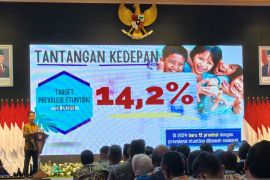The residents' participation in sharing necessary information on stunting with their colleagues in their neighborhood areas can be a gate for more comprehensive efforts to prevent stunting from preconception period to the first 1,000 days of lifeDepok, W Java (ANTARA) - The University of Indonesia's (UI's) Faculty of Public Health has collaborated with the authorities of Babakan Madang Subdistrict administration and Bogor District's health office to educate local residents about stunting prevention efforts.
The targeted participants of this upgrading program were mainly health cadres and apparatuses of village administration in Bogor District, West Java, Head of the UI's Faculty of Public Health Team Evi Martha revealed in a press statement here on Sunday.
"The residents' participation in sharing necessary information on stunting with their colleagues in their neighborhood areas can be a gate for more comprehensive efforts to prevent stunting from preconception period to the first 1,000 days of life," she said.
The upgrading program, for the timebeing, covered four villages in Babakan Madang Subdistrict, Bogor District, but it could later be introducted to many more villages so that more people were able to detect, prevent, and care children with stunted growth.
According to Evi Martha, stunting is always ignored as a serious issue in community though the accumulated cases of malnourishment potentially contribute to the emergence of public health problems in the future.
The prevalence of stunting in Bogor District was recorded at 38.1 percent in 2018. It was higher than those in other districts and cities in West Java, including Depok. The latter's prevalence of stunting stood at 25.7 percent, she said.
The Indonesian Government is well aware of the impact of stunting on the nation's future.
Therefore President Joko Widodo ordered Health Minister Terawan Agus to reduce stunting among Indonesian children at the first plenary meeting of the Indonesia Onward Cabinet 2019-2024 on Oct 24.
Speaking to journalists after attending the cabinet meeting, Agus said he would soon coordinate with his subordinates at the Health Ministry to receive detailed reports about the stunting problem.
"Well, the root causes of this stunting problem are complex. So, we need to coordinate with those from the upper to lower levels to deal with it," he said, adding that improving the public health condition would help resolve the problem of children with stunted growth.
According to the World Health Organization (WHO), children with stunted growth are those whose "height-for-age is more than two standard deviations below the WHO Child Growth Standards median."
The prevalence of stunting in Indonesia could have been reduced to 27.67 percent this year or lower than that of 2018, which was recorded at 30.8 percent.
Related news: Indonesia prioritizes fight for healthy golden generation
Related news: Coordinating Minister to form task force to deal with stunting
Translator: Feru L, Rahmad Nasution
Editor: Gusti Nur Cahya Aryani
Copyright © ANTARA 2019












